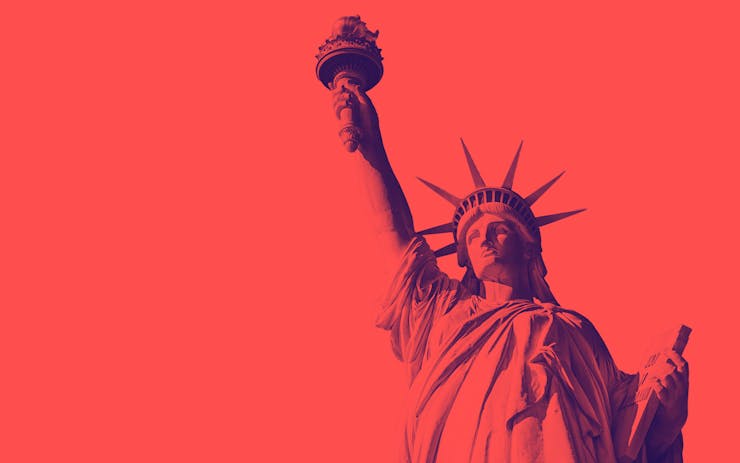The New York State legislature is expected to consider a number of measures to legalize and regulate adult-use cannabis in early 2019.
New York will seriously consider legalization in 2019. And equity must be part of any new law.
With Gov. Andrew Cuomo now in favor of legalization, and New Jersey on track to legalize in the coming months, the issue will get a serious look in Albany starting in January.
Prior to that debate, legalization and social justice advocates gathered earlier this week to find ways to build social equity into any eventual cannabis bill. The Marijuana: Justice, Equity, Reinvestment conference took place at the Albany Capital Center on December 11th and 12th.
The two-day conference, sponsored by the Drug Policy Alliance (DPA), featured New York State Assembly member Crystal Peoples-Stokes (D-Buffalo) and Mount Vernon, NY, city council member Delia M. Farquharson—both of whom are expected to take leading roles in the fight for equitable legalization.
Bake Equity Into the Law
One person who’s already been through that fight, Massachusetts Cannabis Control Commissioner Shaleen Title, told the gathering that it’s going to take hard work to include equity measures in the legalization process. But it’s an absolutely necessary component. “It is time for the old guard to step down and let racial equity progress in New York,” she said.
'Is this going to be a law that legalizes marijuana, or apologizes for legalizing it?'
In her keynote speech, Title addressed those who “have spent countless hours poring over the state marijuana legalization laws,” and pondered the question: “Is this a law legalizing marijuana or apologizing for legalizing it?”
“Many an inane provision has been placed upon the altar of white appeasement,” Title said. “For those who have never been affected by the prohibition of cannabis in the first place, life after legalization goes on largely as it did before. Why are we still writing laws for them?”
The conference featured a number of hard conversations. At one point, an attendee was asked to leave when he complained that the talks and panels focused too much on racial issues and not enough on cannabis legalization.
For the DPA—and many of the attendees—the two issues are deeply intertwined. One of the goals of the conference was to find ways to bake social equity into the New York legalization program from the beginning.
One Example: The Cost of Licenses.
Many at the conference were concerned that minority entrepreneurs have the opportunity to apply for affordable cannabis licenses. Meanwhile, rumors abound about large out-of-state companies suggesting exorbitant license fees—as much as $1 million per license. That would put licenses out of reach for all but the most well-financed candidates.
It doesn’t have to be that way. In Massachusetts, licenses only cost $5,000. Affixing the price at a rate unattainable by the disenfranchised population creates a big business monopoly while squashing craft-scale cannabis and entrepreneurship.
“We have to reject the opportunity to have the licenses raised to that amount, and I will recommend my colleagues do the same,” Assembly member Crystal Peoples-Stokes told the conference.
Not Like Liquor Licenses
Title concurred. New York adult-use licenses should not emulate liquor licenses, she said, where permits are only accessible by the wealthy.
Title urged New Yorkers to avoid a regulatory system where “a privileged group of people are paying lip service to diversity, while fiercely defending a system that awards almost no licenses to people of color and which artificially inflates the value of licenses into the stratosphere.”
MMJ Set up the Wrong Way
Advocates in New York have watched the state’s medical cannabis program in New York get hijacked by big business, and they don’t want to see adult use go down the same road.
“Equity in a regulated adult use market starts with separating licenses, providing an affordable licensing process, offering low-interest loans, and prioritizing opportunities to people historically disenfranchised and imprisoned as a result of the war on drugs,” said Peoples-Stokes. “There must also be widespread public outreach and education targeted in marginalized communities on the various economic opportunities available. When implemented properly, the regulation and taxation of cannabis will further social and economic justice because it will reinvest significantly in communities devastated by over-policing and mass incarceration. Graduation rates will rise, foster care will decrease, neighborhoods will come to life, families will thrive.”
No Equity, No Legalization
In New York, medical marijuana did not include measures aimed to increase equity or inclusion. The regulations excluded people who did not have resources, particularly in impacted communities. Fifty or so people applied for licenses; only two were people of color.
Peoples-Stokes acknowledged that mistakes were made while legalizing medical marijuana. She vowed not to make similar mistakes while authorizing adult use. To that end, she is currently working in cooperation with her colleague, state Sen. Elizabeth Krueger, who represents District 28 on the East Side of Manhattan, on amending legislation.
The bottom line according to Peoples-Stokes: Adult-use marijuana will not be implemented in New York State if it is not inclusive of equity.





